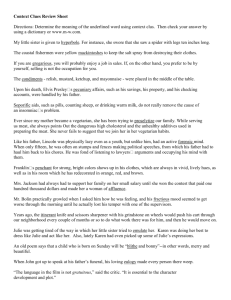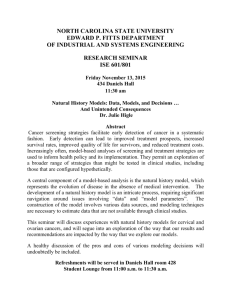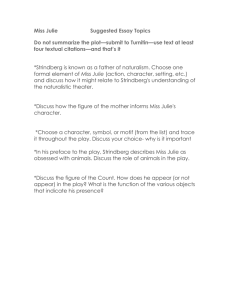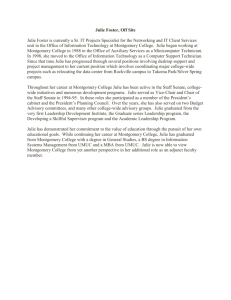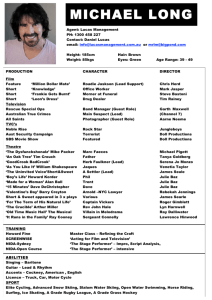Bench Memorandum - American University Washington College of
advertisement
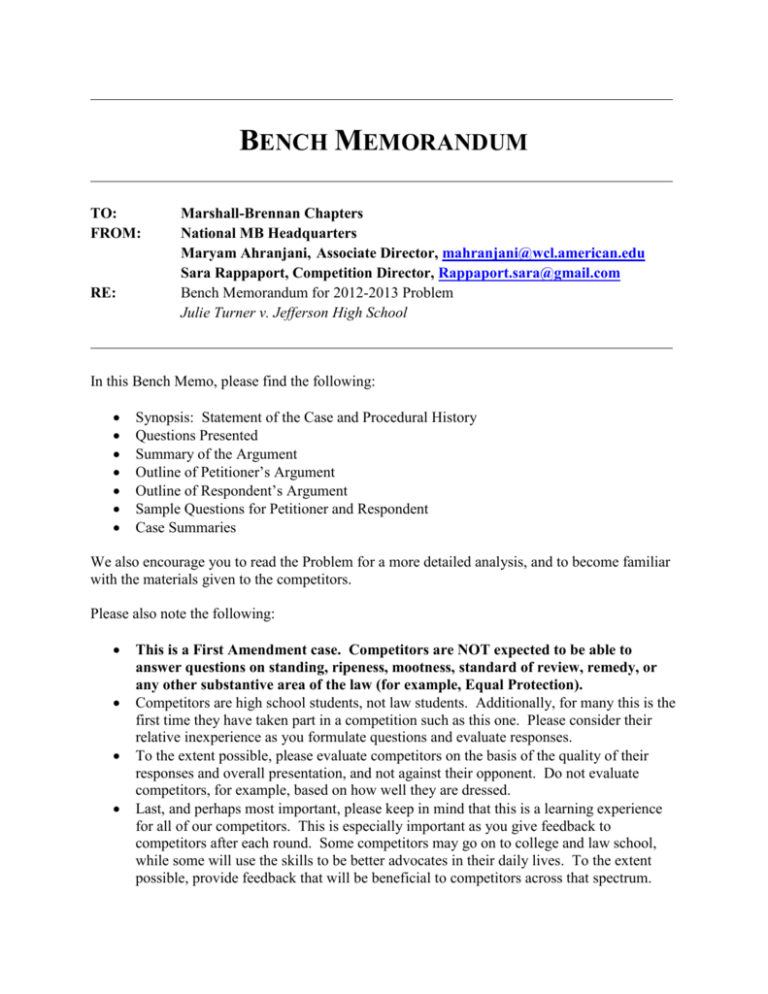
BENCH MEMORANDUM TO: FROM: RE: Marshall-Brennan Chapters National MB Headquarters Maryam Ahranjani, Associate Director, mahranjani@wcl.american.edu Sara Rappaport, Competition Director, Rappaport.sara@gmail.com Bench Memorandum for 2012-2013 Problem Julie Turner v. Jefferson High School In this Bench Memo, please find the following: Synopsis: Statement of the Case and Procedural History Questions Presented Summary of the Argument Outline of Petitioner’s Argument Outline of Respondent’s Argument Sample Questions for Petitioner and Respondent Case Summaries We also encourage you to read the Problem for a more detailed analysis, and to become familiar with the materials given to the competitors. Please also note the following: This is a First Amendment case. Competitors are NOT expected to be able to answer questions on standing, ripeness, mootness, standard of review, remedy, or any other substantive area of the law (for example, Equal Protection). Competitors are high school students, not law students. Additionally, for many this is the first time they have taken part in a competition such as this one. Please consider their relative inexperience as you formulate questions and evaluate responses. To the extent possible, please evaluate competitors on the basis of the quality of their responses and overall presentation, and not against their opponent. Do not evaluate competitors, for example, based on how well they are dressed. Last, and perhaps most important, please keep in mind that this is a learning experience for all of our competitors. This is especially important as you give feedback to competitors after each round. Some competitors may go on to college and law school, while some will use the skills to be better advocates in their daily lives. To the extent possible, provide feedback that will be beneficial to competitors across that spectrum. I. Synopsis: Statement of the Case and Procedural History A. Overview Julie Turner v. Jefferson High School is a First Amendment case dealing with off-campus student speech. In short, the case involves a female high school student who is suspended for posting an offensive message on a school message board. This case examines an important concept within First Amendment jurisprudence: Does a school have the power under the First Amendment to discipline a student for a derogatory comment that the student wrote off campus on a password-protected forum on a school-sponsored website? Competitors representing the Petitioner, Julie Turner, will argue that Julie’s speech was protected by the First Amendment, and therefore the school did not have the power to discipline her. They will use First Amendment cases to argue that speech that occurs off-campus is harder to censor than speech which occurs at school, and that Julie’s speech did not cause a material and substantial disruption. These competitors will argue that cases that allow schools to censor student speech in various contexts do not apply to this case. Competitors representing the Respondent, Jefferson High School, will argue that Julie’s comment did cause a material and substantial disruption at school, and therefore the school was within its power under First Amendment case law to discipline her. They will point to myriad cases in which schools were permitted to censor student speech, and argue that this case should be included in that litany of cases. B. Summary of the Facts Julie Turner was an active and popular student at Jefferson High School. During the relevant time period, she was a Junior, Vice President of the student body, and the founder of the Jefferson High School Community Service Club. In May 2011, Tyler Poole, a senior at Jefferson High School, was suspended for 10 days after he was found with a bottle of Adderall on campus. Tyler had been diagnosed with Attention Deficit and Hyperactivity Disorder and was prescribed Adderall to control his condition. Jefferson High School had adopted a strict policy prohibiting students from entering school grounds with medicine after many students were found dealing prescription drugs on campus. Any student who needed prescription medication was required to leave the medication with the school nurse, who would dispense as needed. Jefferson High had one part-time nurse who often had a line out the door of her office. The school board required that any student who was found with prescription medication on campus would be suspended for a minimum of 7 and a maximum of ten days. Since Tyler had been in trouble multiple times before, he received the harshest punishment. After Tyler’s suspension, many students at Jefferson High School felt that Principal Short had disciplined Tyler too harshly. Julie decided to take matters into her own hands and express her views and the views of her fellow students on the school’s web page. The web page had a message board in which members of the school community could post comments, questions, and suggestions, and engage in discussions with one another. Many parents used this message board 2 to discuss concerns that they had regarding the school, to ask questions to school officials, and to organize carpools and after school activities. Teachers also used this message board to update the school community about current events or important reminders. The message board was visible to any student or parent who signed into the web page using their school identification number. From her home computer, Julie posted a comment on the message board with the subject line “Principal Short should be disciplined himself.” Her comment criticized Principal Short for his “way too harsh” punishment of Tyler, and included several lewd and inappropriate comments about the principal. One comment stated “Principal Short abuses his power as a way to compensate for something.” Julie also asserted her own personal views that prescription medication like Adderall should not be controlled on campus, and encouraged other students to do a better job of hiding medications in their lockers. She accused Principal Short of confiscating the drugs for his own personal use, and ended the comment by saying “Principal Short must have thought that the Adderall was Viagra, which is why he wanted to take it away from Tyler so badly.” After Julie posted her comment, several students at school began talking and laughing at school about what Julie said on the web page. One student printed the comment from the web page and brought it to her English class to show other students. Though the comment did not cause any disruption in the classroom, the English teacher, Ms. Lincoln, confiscated the printed comment and showed it to Principal Short and other administrators. School officials were shocked at the language Julie used, and felt that their authority to discipline students was undermined. After Ms. Lincoln confiscated Julie’s comment, some members of the school community heard about what happened and were outraged. Parents who saw what Julie wrote began calling Principal Short angrily demanding more security at school to prevent prescription drugs from entering school grounds in the first place. A few parents argued that Principal Short acted too harshly in suspending Tyler, and felt that ten days was too long to keep a student out of school. Many parents demanded that the offensive comment be taken down to prevent younger students from seeing Julie’s vulgar language. Principal Short called Julie into his office. He showed her the printed comment that Ms. Adams had confiscated and asked Julie whether she had written the comment. Julie admitted that she did write the comment, and expressed her belief that “it is a free country” and she was free to say whatever she liked. Principal Short called Julie’s parents into a meeting the next day, explained what Julie wrote on the web page, and informed them that he was suspending Julie for five days. C. Procedural Posture Julie and her parents appealed the suspension to the school discipline committee, which upheld Julie’s suspension. Following the committee’s decision, the Turners brought a suit in federal district court against the school claiming that her suspension improperly violated Julie’s First Amendment rights. The court upheld the school’s right to suspend Julie, and the Turners appealed to the Moot Circuit Court of Appeals. The appeals court affirmed the judgment against Julie, and the Turners now appeal to the Supreme Court. 3 II. Issue Presented Does a school have the power under the First Amendment to discipline a student for a derogatory comment that the student wrote off-campus on a password-protected forum on a schoolsponsored website? III. Summary of the Argument A. Material and Substantial Disruption Public school officials have the right to limit student speech that poses a material or substantial disruption to the educational environment. Any limitations, however, must be based on something more than just undifferentiated fear of a disturbance. The Petitioner will argue that Principal Short suspended Julie even though she did not disturb the classroom environment. The disruption did not occur until after the comment was confiscated. The Respondent will argue that Julie did disrupt class. Cases demonstrate that a disruption can occur when speech is lewd or sexual or promotes illegal drug use. Moreover, the comment caused an uprising among the students and the teachers, which disrupted school and undermined Principal Short’s authority. B. Off-Campus Speech Courts have been divided on whether off-campus speech may be censored as student speech. Petitioners rely on cases that treat off-campus speech differently, and that hold that off-campus speech is protected by the First Amendment to a greater degree. Respondents, on the other hand, will rely on cases in which off-campus speech creates a disruption on-campus and is therefore subject to the same restrictions. Both sides will be forced to rely on cases from lower courts, as this issue has not been directly addressed in Supreme Court jurisprudence. IV. Outline of Petitioner’s Argument A. Julie’s speech did not cause a material and substantial disruption. When determining whether schools have the power to censor student speech, courts use the test created in Tinker v. Des Moines Unified School District. In Tinker, the Supreme Court held that schools may censor student speech when that speech causes a material and substantial disruption at school, and this test remains the standard for in-school speech today. 1. Julie’s comment did not cause a material and substantial disruption at school because her speech took place off campus. In creating the rule requiring a material and substantial disruption, the Court in Tinker emphasized the “special characteristics of the school environment” that necessitate restricted First Amendment rights. However, courts subsequently have held that the standard required by Tinker is harder to meet when student speech occurs off campus. Julie’s speech occurred entirely off campus on a website, and courts have repeatedly held that online speech falls within 4 the category of off-campus speech.1 Courts scrutinized a school’s ability to censor off-campus speech, including that which occurs online, because those “special characteristics” referenced in Tinker are not present outside the schoolhouse gate. In Beussink v. Woodland R-IV Regional School District, the District Court for the Eastern District of Missouri ruled that a school violated a student’s First Amendment rights when it disciplined the student for offensive comments he made about school officials on his personal web page. In its ruling, the court reasoned that the student’s online speech did not cause a disruption at school. Similarly, in Killion v. Franklin Regional School District, the District Court for the Western District of Pennsylvania affirmed that schools have less control over off-campus speech because this speech is less likely to cause the disruption required by Tinker. As in these cases, Julie created the comment on her personal computer at home, and school facilities were not used in any way in creating or viewing the comment. 2. Fear of disruption or an administrator being upset by the content of the speech does not rise to the level of disruption. Tinker’s requirement that speech creates an actual disruption is not satisfied by a mere fear that the disruption would occur without disciplinary action. Tinker explicitly states that schools may not suppress students’ speech based on an “undifferentiated fear or apprehension of disturbance.” Instead, it requires an actual disturbance or a concrete and particularized reason to believe that a disturbance would result from the speech. Julie’s comment did not cause a material or substantial disruption. In fact, there was no disruption caused by the comment at all until a teacher confiscated it and turned over to the administration. The Respondent alleges that it still may censor Julie’s speech because of the risk of disruption it posed. However, Tinker and subsequent cases interpreting it have clearly affirmed that schools are not permitted to censor student speech based simply on a risk of disruption. The Respondent’s argument in this regard therefore lacks merit. B. The Respondent’s reliance on Bethel, Morse, and Hazelwood is improper. Cases following Tinker give schools the authority to censor a broader range of speech. Bethel v. Frasier provides that schools may limit speech that is lewd or sexual in nature, and Morse v. Frederick provides that schools do not need to tolerate speech that promotes illegal drug use. Further, Hazelwood v. Kuhlmier allows schools to censor student press when censoring it reasonably relates to important pedagogical goals. 1. The contexts in Bethel and Morse were different than that of Julie’s speech. In Bethel, the Supreme Court ruled that a school was within its power to discipline a student for delivering an inappropriate election speech during a school assembly. In its opinion, the Court indicated that schools do not need to tolerate lewd or sexual speech that takes place on campus. 1 See Beussink v. Woodland R-IV School District, 30 F. Supp. 2d 1175 (E.D. Mo. 1998); Killion v. Franklin Regional School District, 136 F. Supp. 2d 446 (W.D. Pa. 2001). 5 The majority focused on the fact that the speech included sexual innuendo and occurred at an assembly of mostly 14-year-olds. Julie, by contrast, created her online comment entirely off campus and separate from any school event or facilities. In fact, the web site on which her remarks were posted was only accessible by a mature audience of not just students but also parents, faculty, and staff. Further, unlike in Bethel, Julie’s speech was not lewd or sexually inappropriate. In Morse, a student unfurled a large banner at a school-sponsored gathering outside the school to watch the Olympic torch pass. The Court in Morse cites Bethel, explicitly stating that “[h]ad Fraser delivered the same speech in a public forum outside the school context, it would have been protected.” The Court ruled that the school did not violate the student’s First Amendment rights for punishing him for drug-related speech that took place at a school-sponsored event. As mentioned earlier, Julie’s speech did not occur at an open, school-sponsored event, which is different from the context of Joseph Frederick’s banner. 2. Censoring Julie’s speech does not meet the requirements of Hazelwood. In Hazelwood, the court upheld a school’s right to censor student press that violated other students’ anonymity and discussed topics that were too mature for some members of the student body, holding that the school was furthering legitimate pedagogical goals by placing restrictions on student press. By contrast, disciplining Julie for her comment furthered no pedagogical goals. The pedagogical goals with which the court and, quite frankly, the school should be concerned include raising informed citizens who understand and appreciate the Constitution and their rights therein. Censoring student speech because it offends the administration teaches students that their free speech rights are subject to the whim of school or government officials, which is a backward message to teach students. Pedagogical goals would be better furthered by encouraging students’ freedom of expression, as long as it does not disrupt the rights of others. V. Outline of Respondent’s Argument A. Tinker allows schools to censor student speech that causes a material and substantial disruption. Under Tinker, schools may discipline students for speech that causes a material and substantial disruption to the school environment. Generally speaking, the Tinker standard is still the rule that courts use when determining whether censoring student speech is appropriate. However, further case law has given schools more power to censor speech that is disruptive in specific ways. 1. Julie’s comment was materially and substantially disruptive because it was lewd and sexual in nature. In Bethel v. Fraser, the Supreme Court held that a school was within its rights to discipline a student for a lewd election speech he gave at a school assembly. In affirming the school’s right 6 to censor the speech, the Court explicitly stated that a school does not need to tolerate speech that is lewd or sexual in nature. In its ruling, the Court reasoned that lewd and vulgar speech could be inappropriate for younger audiences, and that schools have an interest in protecting minors and the school community as a whole from vulgar and inappropriate language. Similarly, Julie’s speech was lewd and sexual in nature, and therefore, under Bethel, Jefferson High School does not need to tolerate it. In the comment she posted on the internet, Julie wrote that “Principal Short abuses his power as a way to compensate for something,” and suggested that “Principal Short must have thought that the Adderall was Viagra.” Any student at Jefferson High School could see the comment that Julie posted by logging onto the school website with their school identification. Because students often log onto the website to receive updates from the school and their teachers, and to discuss topics relating to school, the online forum is essentially an extension of Jefferson High School. 2. Julie’s comment was disruptive because it promoted illegal drug use. In Morse v. Frederick, the Supreme Court ruled that a school did not violate a student’s First Amendment rights when it suspended him for unfurling a banner at a school-sponsored event that read “Bong Hits 4 Jesus.” The school reasoned that the banner advocated for illegal drug use, and this was in violation of established school policy. The Court agreed that the banner appeared to promote illegal drug use, and ruled that the schools do not need to tolerate this sort of language. Julie’s comment similarly promoted illegal drug use, and therefore Jefferson High School was well within its power to censor this harmful speech. Julie asserted that prescription drugs such as Adderall should not be controlled on campus, and advocated that students do a “better job” of hiding these drugs in their lockers so as not to be confiscated by school officials. This activity is in direct violation of a school rule intended to ensure that Jefferson High School remains a safe and drug-free environment. This sort of language is especially harmful when considering Jefferson High School’s past struggle with students abusing prescription medication such as Adderall, and selling these drugs on school grounds. 3. Courts have upheld a school’s right to censor student speech based on a substantial risk of disruption at school. The Petitioner suggests that schools may not rely on a substantial risk of disruption at school as a reason to censor student speech. However, separate precedent holds that schools may in fact discipline students based on a substantial risk that their speech will cause a disruption in the classroom. In Doninger v. Neihoff, a student was disciplined for posting a comment on her personal web page urging students to call school administrators and “piss them off” after a popular school event was cancelled. The Second Circuit upheld the school’s right to discipline the student based on the substantial disruption that this comment could have caused on campus. This court should rely on Doninger as persuasive precedent, rather than Layshock v. Hermitage School District and J.S. v. Blue Mountain School District as the Petitioner suggests. Like the comment posted in Doniger, Julie’s comment urged the student body to undermine Principal 7 Short’s authority by criticizing his discipline of Tyler and advocating for students to violate the school’s rule controlling prescription medication on campus. Moreover, unlike in the cases relied on by the Petitioner, the threat to Principal Short’s authority and the decorum of the school was more than just hypothetical. Immediately following Julie’s comment, enraged parents began calling Principal Short demanding more security at school, and some parents criticized Principal Short’s decision to discipline Tyler. As Mrs. Ramirez, the mother of Julie’s classmate, testified, young students saw inappropriate language that exceeded their maturity levels. To say Julie’s speech did not cause a disruption is simply untrue. B. The message board was maintained by Jefferson High and the censorship was reasonably related to legitimate pedagogical goals. In Hazelwood School District v. Kuhlmeier, the Supreme Court held that a school district could place heightened restrictions on student speech when it is published in a school newspaper. The Court reasoned that a school newspaper was not a “public forum” because it was produced by the school and was published under the school’s name. The Court in Hazelwood created a new rule governing student press that stated that schools may censor this form of speech when the censorship is reasonably related to legitimate pedagogical goals. 1. The school message board is analogous to student press. The court should follow the rule established by Hazelwood because the school’s message board can reasonably be analogized to student press. The Court in Hazelwood reasoned that student press was different than other forms of speech because student newspapers bear the name of the school and are published under the school’s name. The same can be said of the message board on Jefferson High School’s web page. Julie did not post the comment as an individual on a personal web page, but instead posted the comment on a school-sponsored message board on the school’s web page. This is sufficient to fall under the category of student press. 2. Censorship was reasonably related to legitimate pedagogical goals. Julie’s comment undermined several of the goals of Jefferson High School, including maintaining a drug-free environment. Julie’s comment not only promoted the widespread use of drugs on campus, but also urged students to violate the school’s rule banning students from keeping drugs in their lockers at school. Julie’s comment also undermined the important goal of providing the principal with the authority to discipline students. She blatantly criticized Principal Short’s discipline of Tyler and caused parents to do the same. These are important pedagogical goals that Jefferson High School has an interest in protecting. Because Julie suggested that prescription drugs should not be controlled on campus and criticized Principal Short for his disciplinary procedures, censoring Julie’s speech was reasonably related to these pedagogical goals, and necessary to protect them. 8 VI. Sample Questions for the Petitioner 1. Aren’t students’ rights more limited than adults? 2. Why should the Constitution rather than school rules apply in schools? 3. Aren’t schools supposed to have some power over students, much like parents? How can they do that without having some power over what students say? 4. How do you respond to the respondent’s argument that schools should protect students? Isn’t that an important function of schools? 5. Wasn’t there a material and substantial disruption caused by the comment? Why shouldn’t Tinker apply? 6. Is there Supreme Court precedent governing off-campus speech? 7. Why should the court consider the comment off-campus speech when it was printed and brought on-campus? 8. Isn’t speech on a school’s own web site considered school-sponsored and therefore subject to Bethel and Morse? 9. Didn’t the speech in Morse occur off-campus as well? Why shouldn’t that case apply to off-campus speech, then? VII. Sample Questions for Respondent 1. Isn’t free speech an extremely important right? 2. Should the First Amendment still apply in schools? 3. Why should students have more limited rights than adults? 4. Doesn’t Hazelwood only pertain to student press? Why should it apply to a website? 5. How do you respond to the Petitioner’s argument that the comment did not cause a disruption until it was confiscated? 6. Are there any cases that directly say that schools can censor off-campus speech? 7. How do you respond to the Petitioner’s argument that the school cannot censor student speech just because administrators do not like what she is saying? 9 Case Summaries Tinker v. Des Moines Independent Community School District, 393 U.S. 503 (1969) In 1965, students wore black armbands to school to protest the Vietnam War, even though the school had adopted a policy that banned the wearing of black arm bands. Two students were suspended. The students and their parents brought a suit against the school district alleging that their First Amendment rights were violated. The Supreme Court held that the school could not punish the students without any evidence that the arm bands materially and substantially interfered with school discipline or the school environment. Bethel School District No. 403 v. Fraser, 478 U.S. 675 (1986) Matthew Fraser, a student at Bethel High School, filed a civil rights action after he was disciplined for lewd language he used in a student government campaign speech at a student assembly. Among his comments were statements like, “I know a man who is firm – he’s firm in his pants, he’s firm in his shirt, his character is firm – but most of all, his belief in you…is firm….Jeff is a man who will go to the end – even the climax, for each and every one of you….” The Supreme Court held that the school district acted within its authority in disciplining Fraser and in creating a policy against offensive speech because schools do not have to tolerate lewd or sexual speech. Morse v. Frederick, 551 U.S. 393 (2007) An 18-year-old high school student displayed a banner that said “BONG HiTS 4 JESUS” across the street from his school during a parade. Principal Deborah Morse suspended Joseph Frederick. The U.S. Supreme Court ruled that Morse did not violate Frederick’s free speech rights. The Court said that school officials may prohibit speech that is understood to promote illegal drug use. The Court treated the banner display as a school-sponsored event, although the display was across the street from school and students were permitted to leave school to watch the Olympic torch pass by. Hazelwood School District et al. v. Kuhlmeier et al., 484 U.S. 260 (1988) Staff members of a high school newspaper filed a First Amendment action claiming that their First Amendment rights were violated by censorship of certain articles in the school newspaper. The Supreme Court held that the high school paper that was published by students in a journalism class did not qualify as a "public forum," so school officials retained the right to impose reasonable restrictions on student speech in the paper. The court created a new rule for student press that stated that schools may censor student press when the censorship is reasonably related to legitimate pedagogical goals. Beussink v. Woodland R-IV School District, 30 F. Supp. 1175 (E.D. Mo. 1998) Brandon Beussink, a student at Woodland High School, sued the school district after he was disciplined for criticizing school officials on his personal Internet homepage. The District Court held that Beussink’s First Amendment rights were violated, and explained that the web page did not cause a disruption at school. The Court also held that the school could not discipline the student just because they did not like what he was saying. 10 Killion v. Franklin Regional School District, 136 F. Supp. 2d 446 (W.D. Pa. 2001) A high school student was disciplined for printing a “top 10” list with offensive statements about a faculty member. The student and his mother brought an action alleging violations of First Amendment and due process rights by the school district and administrators who tried to suspend him. The District Court held that the student's document did not disrupt school or interfere with anyone's substantial rights, so the student’s first amendment rights were violated. The court also made clear that schools have less control over off-campus and online speech. Layshock v. Hermitage School District, 650 F.3d 205 (3rd Cir. 2011) A high school senior created a false MySpace page for his principal that included descriptions of alcohol and illegal drugs possession in his school office. Though the page was created off campus and outside of school time, a three judge panel of the Third Circuit found that this page created a disruption at school and therefore the administration could discipline the student. The entire Third Circuit sitting together reversed the three-judge panel, and found that the MySpace profile made outside the school is protected by the First Amendment, and the school could not punish him. J.S. v. Blue Mountain School District, 650 F.3d 915 (3rd Cir. 2011) An eighth grader created a false MySpace page that made fun of her principal. She used his actual photo and included vulgar confessions of made-up sexual encounters between the principal and students. The Third Circuit held that that school officials could not discipline students for off-campus speech on the Internet. Doninger v. Neihoff, 527 F.3d 41 (2nd Cir. 2008) A student announced the cancellation of a school event on her LiveJournal page and urged other students to call the administration to “piss them off.” The school disciplined the student by barring her from running for student government. The Second Circuit held that the student’s online speech posed a substantial risk of disruption at school, so it ruled that the suspension was proper. 11
